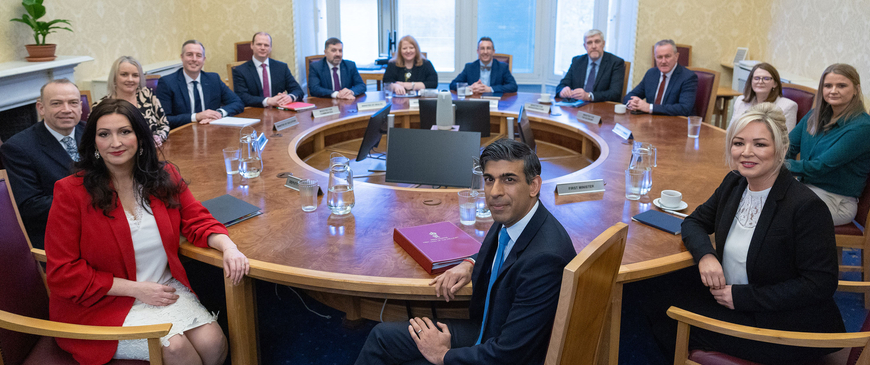
A new equilibrium in Northern Ireland: Can it last?
The agreement between the British government and the Democratic Unionist Party addresses immediate challenges but falls short of resolving Northern Ireland’s Brexit conundrum.
When the Windsor Framework emerged from the negotiations between the European Union and the British government in February 2023, Northern Ireland’s Democratic Unionist Party (DUP) stood in firm opposition. For the DUP, the Windsor agreement and its contentious precursor, the Northern Ireland Protocol, undermined Northern Ireland’s standing within the UK. The party changed its stance, however, after striking an agreement with the British government in late January. The deal has led to the restoration of power-sharing in Northern Ireland, breaking the two-year impasse caused by the unionists’ refusal to enter the Northern Ireland Assembly, the region’s devolved parliament.
For the first time in Northern Ireland’s century-long history, a nationalist figure, Michelle O’Neill from Sinn Féin, has assumed the position of First Minister. While the role is constitutionally on par with the Deputy First Minister post, O’Neill’s appointment carries significant symbolic weight in a region which was historically dominated by unionists and where symbols and identities hold paramount importance. At the same time, the DUP’s acquiescence to a compromise over Brexit marks a watershed moment in a process that has divided Northern Irish politics and the unionist community. With the devolved parliament and government functional again, there appears to be a semblance of equilibrium in Northern Ireland after a tumultuous couple of years.
The DUP’s acquiescence to a compromise over Brexit marks a watershed moment in a process that has divided Northern Irish politics and the unionist community.
The new settlement
At the core of the deal with the DUP lie two elements. The first is a financial injection of over £3.3 billion that British Prime Minister Rishi Sunak has granted to Northern Ireland – a fiscal boon equivalent to about 6 per cent of the region’s economic output, which the unionists will take credit for and which will draw envy from other parts of the UK. The second is a suite of measures – some operational, others primarily symbolic – aimed at improving the Protocol and the Windsor Framework. All of the key tenets of the Windsor deal remain intact: goods originating from Great Britain bound for Northern Ireland, and due to remain there, will avoid most checks and formalities using a ‘green lane’ for border movements; those goods destined for Ireland or the wider EU will go through a ’red lane’ and undergo standard controls and paperwork; Northern Ireland will continue to align with EU single market regulations and the European Court of Justice will determine how the rules apply. However, the Sunak administration has eased some operational elements of the Protocol and the Framework, including by enshrining in law the principle of ‘unfettered access’ for qualifying Northern Irish-produced goods moving to the rest of the UK, and by rebranding the ‘green lane’ as an ‘internal market system’.
Nevertheless, the deal also makes a few more substantive changes. Firstly, agricultural importers into Northern Ireland will now benefit from some of the UK’s tariff-rate quotas (TRQs), which allow some food imports into the UK from overseas at lower tariffs than would normally apply. The agreement does not give Northern Ireland full access to all UK-negotiated TRQs, as Brussels has only agreed that traceable goods should benefit, in order to limit the risks to its own market. At the same time, Northern Irish producers will be exposed to direct competition from New Zealand lamb and the like, thanks to the UK’s new free-trade agreements.
Secondly, the British government wants all retail traders in Great Britain to label goods intended for the domestic market as ‘not-for-EU’. Previously, this requirement only applied to products going from Great Britain to Northern Ireland via the green lane. However, by extending this condition to all UK producers – except for Northern Irish producers exporting specifically to the Republic of Ireland or the wider EU – the government would erect a significant new trading barrier. This move would particularly impact the agrifood sector, which accounted for 65 per cent of all exports to the EU in 2023. The change to the labelling rules is a symbolic concession to the DUP but will mean more red tape for businesses and will undermine the UK’s already weak export performance.
Thirdly, the UK now has legislation aimed at preventing future agreements with the EU that might erect fresh regulatory barriers between Great Britain and Northern Ireland. A generous interpretation of this move is that the British government is acting pre-emptively to mitigate the risk of future divergence in trade across the Irish Sea. A more sceptical view is that this measure is strategically crafted to hinder further integration of Northern Ireland into the EU single market. Above all, laws to prevent new regulatory barriers seem unnecessary. Future agreements with the EU are unlikely to be a real risk – particularly if they bring Great Britain closer to Northern Ireland on goods regulations. The bigger concern is that Westminster may adopt legislation that deviates from the current EU standards applicable in Northern Ireland.
Future agreements with the EU are unlikely to be a real risk – particularly if they bring Great Britain closer to Northern Ireland on goods regulations.
In a nod to the unionists’ concerns, the deal also strives to clarify Northern Ireland’s ‘constitutional position’. For example, it establishes a new East-West Council to bolster ties between Northern Ireland and Great Britain. Constitutional experts have raised questions about this part of the agreement. It is unprecedented for the British government to negotiate new constitutional agreements concerning Northern Ireland only with one political party – a departure from the principles enshrined in the 1998 Belfast/Good Friday Agreement (GFA) in which the British government guarantees 'rigorous impartiality' on behalf of all people in Northern Ireland.
Finally, the British government has strengthened the oversight of the new arrangements. It has entrusted the independent Office of the Internal Market (OIM) with the role of monitoring any adverse effects stemming from divergence between Great Britain and the EU on market competition within Northern Ireland – a crucial issue which I previously highlighted as a shortcoming of the Windsor Framework before the House of Lords European Affairs Committee. The risk is that, if Great Britain diverges from EU standards, goods originating from Great Britain might fall short of the standards in Northern Ireland, yet may still legally be sold there. This could place local producers at a disadvantage vis-à-vis their counterparts elsewhere in the UK. The OIM should now monitor this risk and recommend that the British government address any such issues.
The challenges ahead
Moderate unionists, including the DUP’s leader, Sir Jeffrey Donaldson, laud the concessions they secured and the extra cash earmarked for Northern Ireland’s ailing public services. But dissent simmers within the DUP ranks and among hardline factions like the Traditional Unionist Voice, which view the deal as a betrayal of unionist principles. The moderates make a valid point; there is little more that the party could have extracted from British ministers without reopening the hard-fought agreement with the EU – an outcome that neither London nor Brussels desires. Moreover, the hardliners, who have opposed virtually all compromises in recent years, never presented an alternative.
The deal’s practical implementation will be a challenge. Although the Windsor Framework significantly reduces checks on goods moving across the Irish Sea, the risk of border friction will increase when Great Britain diverges from EU rules relating to trade in goods that apply to Northern Ireland, or when the European Commission adopts new regulations applicable in the region. Admittedly, these risks will be monitored by an intricate system of new committees that are being established to tackle any emerging threats. But the practical execution of these measures – many of which will be overseen by the resource-strapped Northern Irish Assembly – will be a formidable task.
Sustaining these arrangements will demand constant management and oversight. For businesses importing into Northern Ireland, navigating the rules will carry costs; British exporters to the EU will face higher compliance costs due to the new labelling requirements; Northern Irish law-makers will consume precious time and administrative capacity keeping an eye on the risks of divergence; and officials and politicians in Westminster will have to think carefully about Northern Ireland when discussing new regulations that may affect trade across the Irish Sea. And for Brussels, Northern Ireland will remain a sui generis case in the implementation of EU single market rules, disliked by lawyers for its constant need for derogations and by politicians for its potential to set unwelcome precedents.
For businesses importing into Northern Ireland, navigating the rules will carry costs; British exporters to the EU will face higher compliance costs.
However, a bigger concern is the risk that the new arrangements will be politicised. Their durability hinges on continued backing from all major political actors in the region. In some ways, this is inherent to Northern Ireland’s governance, as it is built into the GFA. But the new arrangements might amplify the opportunities for politicians to exploit disagreements for their own electoral goals.
The first big test will be in December 2024 when Northern Ireland’s lawmakers (MLAs) decide whether to keep the trading arrangements in place. A 'democratic consent mechanism', originally negotiated by Boris Johnson, gives MLAs an opportunity to vote on these arrangements every couple of years. If a simple majority agrees, the status quo endures until another vote four years later (doubled to eight if there is cross-community support). Failure to secure a majority in December would nullify the core of the Windsor Framework, forcing the UK and the EU back to the negotiating room.
Even if MLAs support these arrangements, they will have other opportunities to voice their views. The ‘Stormont brake’, part of the Windsor deal, allows a group of at least 30 MLAs, from at least two political parties, to object to changes to EU regulations that apply in Northern Ireland. Even though strict conditions must be met for the brake to be used, there is a risk that dissatisfied MLAs might test the mechanism simply to prove their point. Not even the most carefully crafted institutional design is immune to politicisation – a recurrent menace in Northern Ireland.
The fundamental dilemma and a Labour government
While Sunak’s government deserves credit for charting a pragmatic course and revitalising trust with the EU, the fundamental quandary persists. Four successive Conservative governments have grappled with the question of how to enable Great Britain to leave the single market and customs union, giving it the freedom to diverge from EU rules, while simultaneously maintaining a seamless border on the island of Ireland and unimpeded trade between Northern Ireland and Great Britain, all without jeopardising the hard-won peace process.
The only credible and practical answer thus far has been for Northern Ireland to align with EU rules on goods – along with a complex and nuanced swathe of derogations that minimise burdensome controls in the Irish Sea and afford Northern Ireland a special status in the EU single market. If, however, Northern Irish politics gets in the way or if relations between London and Brussels sour, the delicate equilibrium upon which these arrangements rests could falter.
The reality is that fully addressing the challenges that Brexit has created in Northern Ireland requires regulatory uniformity in goods trade between the entire UK and the EU. Only that would allow the movement of goods both east-west and north-south with minimal friction. The present arrangements obscure the immediate need for this solution, but they ultimately leave Northern Ireland’s Brexit conundrum only partially resolved.
Fully addressing the challenges that Brexit has created in Northern Ireland requires regulatory uniformity in goods trade between the entire UK and the EU.
In its efforts to appease the unionists, the British government has gone to great lengths to argue that the vast majority of Northern Ireland’s economic ties are now with the UK, diminishing the significance of trade with Ireland. In reality, however, over the last decade, Northern Ireland’s trade with Great Britain has dropped from 62 per cent of its total in 2013 to 56 per cent in 2022 – hardly the ‘vast majority’ that the government boasts. Meanwhile, about a third of Northern Ireland’s trade is now with the EU (including with Ireland and the rest of the EU), as illustrated in Chart 1.

Moreover, Northern Ireland’s trade in goods has shifted considerably in favour of the EU in recent years. Great Britain’s trade with Northern Ireland has remained stagnant since 2016, while Ireland’s share has surged by 66 per cent during the same period, as depicted in Chart 2. Contrary to what the Conservative governments since Johnson have argued, the data underscores a clear reality: Northern Ireland’s trade matters in both directions – east-west and north-south – and needs to be prioritised equally by present and future British governments.
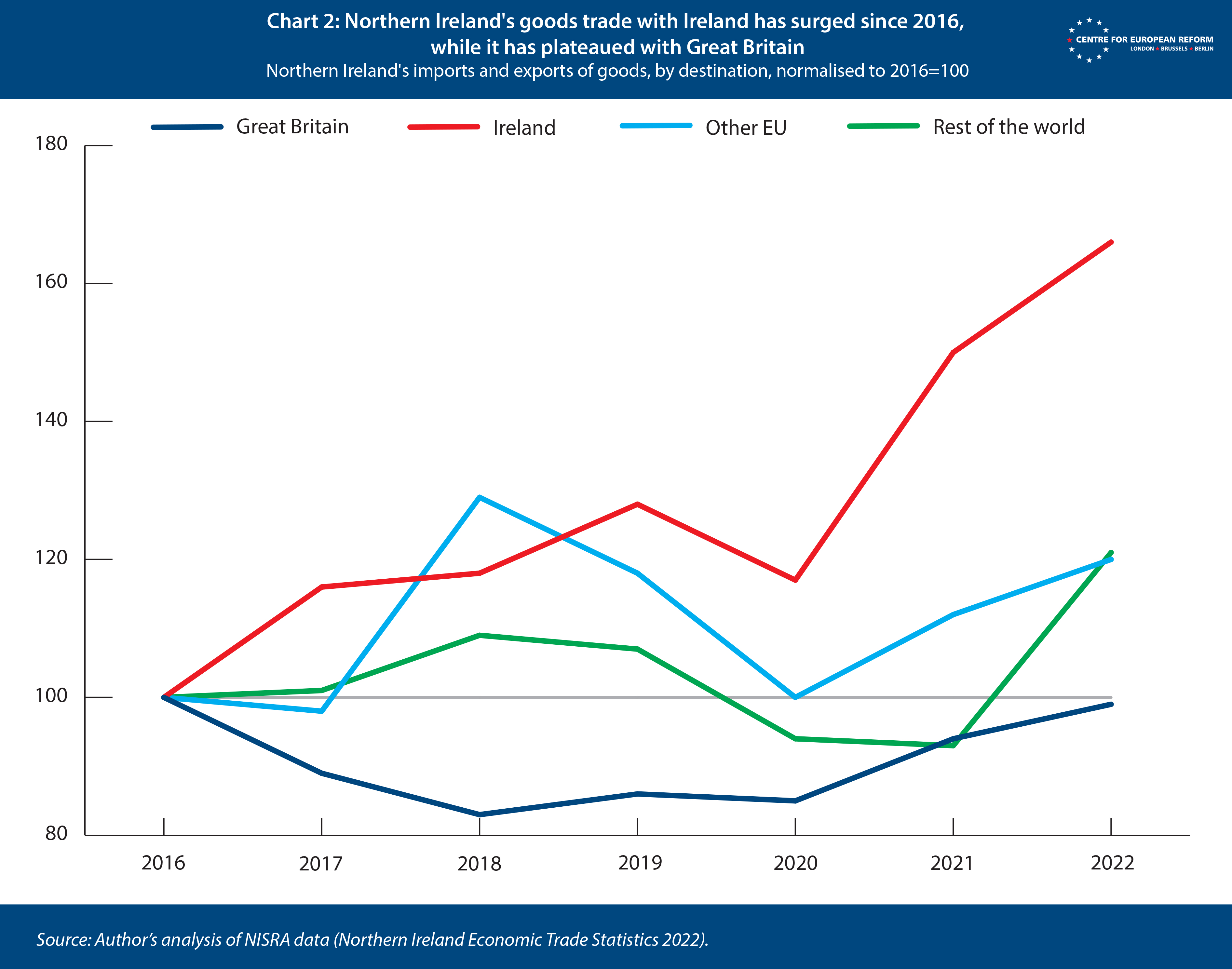
If, as the polls indicate, the Labour Party wins the next general election, it will have to confront the challenges inherited from the Conservatives. Sir Keir Starmer, the party’s leader, has called for a UK-wide veterinary agreement with the EU. While this could help address the uniformity challenge to some extent, a Labour government would need to align domestic rules with the EU not only in animal and plant health but also in product standards and energy. If new ministers act swiftly, this could help pre-empt new tricky issues, such as the implementation of the EU’s new carbon border levy – the so-called 'CBAM'. From 2026, importers of carbon-intensive goods to the EU, such as steel and fertilisers, will face new tariffs. The EU will likely ask for the tax to apply in Northern Ireland to prevent carbon leakage into the single market. The British government has committed to implementing its own carbon tax by 2027, but resolving the issue for Northern Ireland requires policy convergence with the EU – ultimately, by linking the UK’s own emissions trading system with the EU’s. The alternative to this is either a fierce fight with Brussels or imposing a new trading barrier in the Irish Sea – neither of which would appeal to a Labour government.
Some on the Conservative right will decry such policies as a betrayal of Brexit. But history attests to the failure of previous strategies, from Theresa May’s ‘backstop’ and the European Research Group’s ‘alternative arrangements’ panacea, through to Boris Johnson’s flawed Protocol and Liz Truss’ attempt at a unilateral rewrite of that international treaty. Ranging from simply unworkable to downright dangerous, their ideas have all fallen short. Sunak’s solution is being tested and, should it falter, a future Labour government must be ready to trial its own strategies.
For the time being, Northern Ireland finds itself in a new equilibrium thanks to the agreement reached in Brussels last year and in Belfast in January. This marks a significant achievement. But it would be a mistake to assume that this painful saga is now over.
Anton Spisak is a policy analyst and former UK government official.

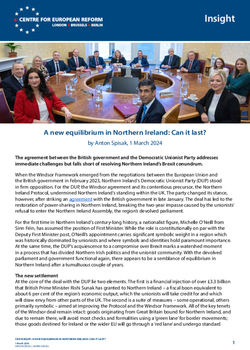
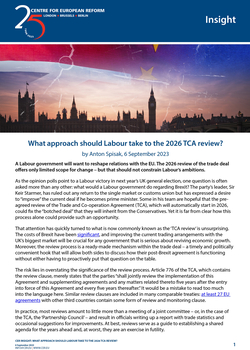
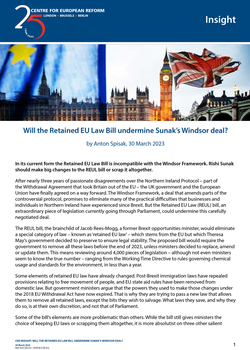
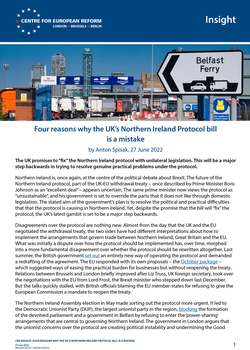
Add new comment